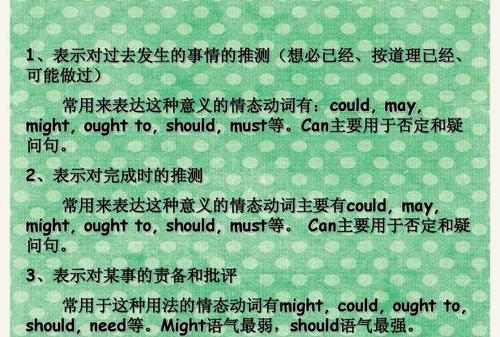英语中的情态动词在过去时态中有各自的用法和规则。例如,“can”表示过去的能力或技能,“could”表示过去的能力、技能或许可性,“may”表示过去的可能性、建议或请求,“might”表示过去的可能性或建议,“shall”表示过去的命令或建议,“should”表示过去的建议或期望,“will”表示过去的意愿或承诺,“would”表示过去的习惯、偏好或委婉的请求。情态动词的选择需要根据句子的意思和语境来确定。

首先,我们需要了解情态动词的种类以及它们的用途。常见的情态动词有can、could、may、might、shall、should、will、would、must等。它们在过去时态中的用法也不尽相同。
- can
can在过去时态中可以用于表示过去的能力或技能,例如:
- He couldn't swim when he was young. (他小时候不会游泳。)
- could
could则表示过去的能力、技能或许可性,也可以表示过去的礼貌或请求。例如:
- I could run faster when I was younger. (我年轻时跑得更快。)
- Could you please pass me the salt? (你能把盐递给我吗?)
- may
may在过去时态中表示过去的可能性、建议或请求,例如:
- He may have forgotten his keys at home. (他可能把钥匙忘在家里了。)
- May I use your phone for a minute? (我能用一下你的手机吗?)
- might
might也表示过去的可能性或建议,但语气更加委婉,例如:
- She might have missed the train. (她可能错过了火车。)
- You might want to try this new restaurant. (你可以尝试一下这家新餐厅。)
- shall
shall在过去时态中表示过去的命令或建议,例如:
- He said we shall finish the project by Friday. (他说我们应该在周五之前完成这个项目。)
- Shall we go see a movie tonight? (我们今晚去看电影好吗?)
- should
should表示过去的建议或期望,例如:
- You should have studied harder for the exam. (你应该更努力地备考。)
- We should go to bed earlier tonight. (我们今晚应该早点睡觉。)
- will
will在过去时态中表示过去的意愿或承诺,例如:
- He said he will come to the party last night. (他说他昨晚会来参加聚会。)
- I promised that I will finish the report by tomorrow. (我承诺明天之前完成这份报告。)
- would
would表示过去的习惯、偏好或委婉的请求,例如:
- When I was young, I would play soccer every day. (我小时候每天都会踢足球。)
- Would you mind closing the window? (你能把窗户关上吗?)

